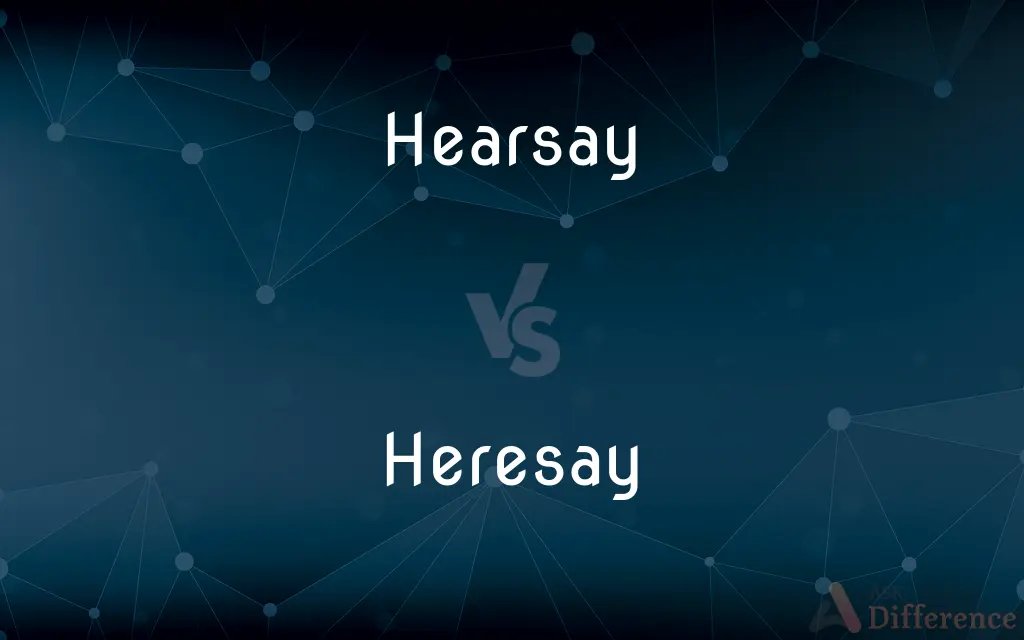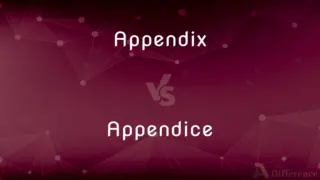Hearsay vs. Heresay — Which is Correct Spelling?
By Tayyaba Rehman & Fiza Rafique — Updated on March 19, 2024
The correct spelling is "Hearsay," while the incorrect spelling is "Heresay." Hearsay refers to information received from others that cannot be substantiated.

Table of Contents
Which is correct: Hearsay or Heresay
How to spell Hearsay?

Hearsay
Correct Spelling

Heresay
Incorrect Spelling
ADVERTISEMENT
Key Differences
If you remember that "ear" is in the middle of "Hearsay," you won't spell it as "Heresay."
"Say" in "Hearsay" is about what you've heard someone say, connecting both actions.
Remember that "Hearsay" begins with the word "hear," which helps you think about hearing something from someone else.
"Heresay" looks like "here say," which doesn't make sense as the information isn't originating from 'here.'
Think of "Hearsay" as a combination of "hear" and "say," both verbs related to the word.
ADVERTISEMENT
How Do You Spell Heresay Correctly?
Incorrect: She didn't believe the rumors, dismissing them as mere heresay.
Correct: She didn't believe the rumors, dismissing them as mere hearsay.
Incorrect: During the meeting, they relied on heresay to make their decision.
Correct: During the meeting, they relied on hearsay to make their decision.
Incorrect: It's difficult to determine the truth when there's so much heresay involved.
Correct: It's difficult to determine the truth when there's so much hearsay involved.
Incorrect: The judge dismissed the evidence because it was considered heresay.
Correct: The judge dismissed the evidence because it was considered hearsay.
Incorrect: The story changed with each telling, becoming nothing more than heresay.
Correct: The story changed with each telling, becoming nothing more than hearsay.
Hearsay Definitions
Hearsay is information heard from someone else but not verified.
The rumor was just hearsay.
Hearsay can be information that isn't directly observed.
I don't believe it; it's hearsay.
Hearsay can mean unverified information spread by word of mouth.
The warning turned out to be hearsay.
Hearsay often refers to gossip or rumors.
The community thrived on hearsay.
In law, hearsay is testimony based on what someone else said.
The judge disallowed the hearsay evidence.
Hearsay evidence, in a legal forum, is testimony from a witness under oath who is reciting an out-of-court statement, the content of which is being offered to prove the truth of the matter asserted. In most courts, hearsay evidence is inadmissible (the "hearsay evidence rule") unless an exception to the hearsay rule applies.
Unverified information heard or received from another; rumor.
(Law) Evidence that is not within the personal knowledge of a witness, such as testimony regarding statements made by someone other than the witness, and that therefore may be inadmissible to establish the truth of a particular contention because the accuracy of the evidence cannot be verified through cross-examination.
Information that was heard by one person about another that cannot be adequately substantiated.
(law) Evidence based on the reports of others, which is normally inadmissible because it was not made under oath, rather than on personal knowledge.
(law) An out-of-court statement offered in court for the truth of the matter asserted, which is normally inadmissible because it is not subject to cross-examination unless the hearsay statement falls under one of a number of exceptions.
Report; rumor; fame; common talk; something heard from another.
Much of the obloquy that has so long rested on the memory of our great national poet originated in frivolous hearsays of his life and conversation.
Gossip (usually a mixture of truth and untruth) passed around by word of mouth
Heard through another rather than directly;
Hearsay information
Hearsay Meaning in a Sentence
They found it hard to ignore the hearsay surrounding the incident.
The rumor was just hearsay and had no factual basis.
The story was spread through hearsay and quickly got out of control.
Many historical accounts are considered hearsay and are taken with caution.
Hearsay can lead to false accusations and harm reputations.
Hearsay often causes misunderstandings among friends.
The community was rife with hearsay about the upcoming changes.
Legal professionals caution against the use of hearsay in making judgments.
The book was criticized for relying too much on hearsay.
To base one's opinion on hearsay is not very reliable.
He was careful not to spread hearsay without verifying the facts.
Hearsay can sometimes be the only lead in an investigation.
Hearsay is not admissible as evidence in court.
Students were reminded not to engage in spreading hearsay.
Gossip columns are often filled with hearsay rather than truth.
Without solid evidence, their case was built on hearsay.
She advised them to be wary of making decisions based on hearsay.
Understanding the difference between hearsay and evidence is crucial in legal studies.
Hearsay contributed to the confusion during the emergency.
The dispute was fueled by hearsay from both parties.
Hearsay Idioms & Phrases
Hearsay evidence
Testimony in court that is not based on a witness's direct knowledge but on what others have said.
The lawyer argued that the testimony was just hearsay evidence and should not be considered.
Common Curiosities
What is the root word of Hearsay?
The root words are "hear" and "say."
Why is it called Hearsay?
It's called hearsay because it refers to information that one has "heard" someone "say," but not directly witnessed.
Which vowel is used before Hearsay?
The vowel "a" as in "a hearsay."
What is the singular form of Hearsay?
Hearsay is both singular and plural.
Which preposition is used with Hearsay?
"On" or "about" as in "hearsay about" or "hearsay on."
What is the verb form of Hearsay?
There isn't a direct verb form of "Hearsay."
What is the plural form of Hearsay?
Hearsay (it's an uncountable noun).
What is the pronunciation of Hearsay?
Pronounced as /ˈhɪrˌseɪ/.
Which conjunction is used with Hearsay?
"And" is commonly used, as in "rumors and hearsay."
Is Hearsay a noun or adjective?
Hearsay is a noun.
Is Hearsay an adverb?
No, it's not an adverb.
Is Hearsay a collective noun?
No, it's not a collective noun.
Is the Hearsay term a metaphor?
No, it's not a metaphor.
Is the word Hearsay imperative?
No, it's not imperative.
How many syllables are in Hearsay?
Two syllables.
What is another term for Hearsay?
Rumor, secondhand information.
Is Hearsay an abstract noun?
Yes, it's an abstract noun.
Is Hearsay a negative or positive word?
Generally considered neutral, but can be negative depending on context.
Is the word “Hearsay” a Direct object or an Indirect object?
It can serve as a direct object in a sentence.
What is a stressed syllable in Hearsay?
The first syllable, "Hear," is stressed.
Is Hearsay a vowel or consonant?
Hearsay is a word that consists of both vowels and consonants.
Is Hearsay a countable noun?
No, it's an uncountable noun.
Is the word Hearsay a Gerund?
No, it's a noun.
How do we divide Hearsay into syllables?
Hear-say.
What part of speech is Hearsay?
It's a noun.
Which determiner is used with Hearsay?
"Some" as in "some hearsay," or "the" as in "the hearsay."
How is Hearsay used in a sentence?
The detective decided not to trust the hearsay and went to collect more reliable evidence.
Which article is used with Hearsay?
The article "the" can be used, as in "the hearsay."
What is the opposite of Hearsay?
Verified fact, firsthand information.
Share Your Discovery

Previous Comparison
Appendix vs. Appendice
Next Comparison
Doctrination vs. IndoctrinationAuthor Spotlight
Written by
Tayyaba RehmanTayyaba Rehman is a distinguished writer, currently serving as a primary contributor to askdifference.com. As a researcher in semantics and etymology, Tayyaba's passion for the complexity of languages and their distinctions has found a perfect home on the platform. Tayyaba delves into the intricacies of language, distinguishing between commonly confused words and phrases, thereby providing clarity for readers worldwide.
Co-written by
Fiza RafiqueFiza Rafique is a skilled content writer at AskDifference.com, where she meticulously refines and enhances written pieces. Drawing from her vast editorial expertise, Fiza ensures clarity, accuracy, and precision in every article. Passionate about language, she continually seeks to elevate the quality of content for readers worldwide.














































